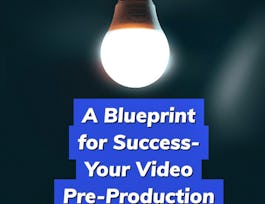Copyright questions about different formats (data, images, music and video) can be especially difficult. Sometimes the law specifically distinguishes between these different formats, and in most cases there are media-specific considerations that impact a copyright analysis. In this course we will look at four different media, paying special attention to the unique issues for each one and the kinds of information that is important when making copyright decisions for each type of material. We will work through fair use issues for each multimedia format, look at format-specific exceptions in the law, and consider unique issues for seeking permission for film, music, images and data.



Copyright for Multimedia



Instructors: Kevin Smith, M.L.S., J.D.
Sponsored by ITC-Infotech
24,209 already enrolled
(412 reviews)
Details to know

Add to your LinkedIn profile
12 assignments
See how employees at top companies are mastering in-demand skills


Earn a career certificate
Add this credential to your LinkedIn profile, resume, or CV
Share it on social media and in your performance review

There are 5 modules in this course
Copyright questions about different formats – data, images, music and video – can be especially difficult. Sometimes the law specifically distinguishes between these different formats, and in most cases there are media-specific considerations that impact a copyright analysis. In this course we will look at four different media types, paying special attention to the unique issues for each one and the kinds of information that are important when making copyright decisions. We will work through fair use issues for each multimedia format, look at specific exceptions in the law, and consider unique issues for seeking permission for film, music, images and data. At the end of this course, participants will have a deeper understanding of how to apply our framework for making copyright decisions, and will be more comfortable with assessing multimedia issues.
What's included
2 videos4 readings
Data can refer to many different types of materials, and the copyright situation is different depending on what particular type of data is meant. In this module we will consider the different potential types of data, the rights associated with each one, and the copyright considerations involved when using data. We will look carefully at how fair use applies in various data-use situations.
What's included
2 videos1 reading1 assignment
Those who create or use works of visual arts benefit from an understanding copyright protections and exemptions. Topics covered in this module include which works of visual arts get copyright protection, what special rights are afforded artists under the Visual Artists Rights Act (VARA), how to apply the TEACH Act and fair use to images, and what steps to take if you need to seek permission. Finally, some attention will be given to social media, implied licenses that can arise when posting and using images, and privacy.
What's included
9 videos2 readings3 assignments
Copyright for music, and especially for recording music, is extremely complicated and difficult to untangle. In this module we will explore the multiple rights that must be accounted for in almost every musical composition or recording. We will pay special attention to the multitude of licenses that come in to play when creating or using music. Exceptions for using music in teaching will be covered, and we will examine fair use considerations for different musical situations in detail. This is a module that has important implications for musicians, music teachers, librarians, and all those who want to use or reuse music.
What's included
12 videos4 readings3 assignments
Copyright issues for film tend to be complicated because of the number of creators and creative works that come together to make them. In this module, students will learn to apply the fundamentals of copyright with regard to film. Topics covered include identification of the various rights and rights holders involved in many films, the role of copyright exceptions when creating or using film in educational settings, and when and how to seek permission to make use of copyrighted material in films.
What's included
11 videos2 readings5 assignments
Instructors


Why people choose Coursera for their career




Learner reviews
412 reviews
- 5 stars
71.35%
- 4 stars
21.60%
- 3 stars
5.09%
- 2 stars
0.97%
- 1 star
0.97%
Showing 3 of 412
Reviewed on Jun 11, 2018
This is my first course on Copyrights. I thoroughly enjoyed it. A great course for the beginners in the field of Copyrights ..Thank you very much.
Reviewed on Jun 4, 2017
Great course! Good introduction ti US copyright law, very interesting and clear. I strongly recommend this course!
Reviewed on Jul 11, 2017
This was a really great course and has increased my interest and knowledge in intellectual property law.
Recommended if you're interested in Arts and Humanities

University of Colorado Boulder

Michigan State University

Yale University

Open new doors with Coursera Plus
Unlimited access to 10,000+ world-class courses, hands-on projects, and job-ready certificate programs - all included in your subscription
Advance your career with an online degree
Earn a degree from world-class universities - 100% online
Join over 3,400 global companies that choose Coursera for Business
Upskill your employees to excel in the digital economy







